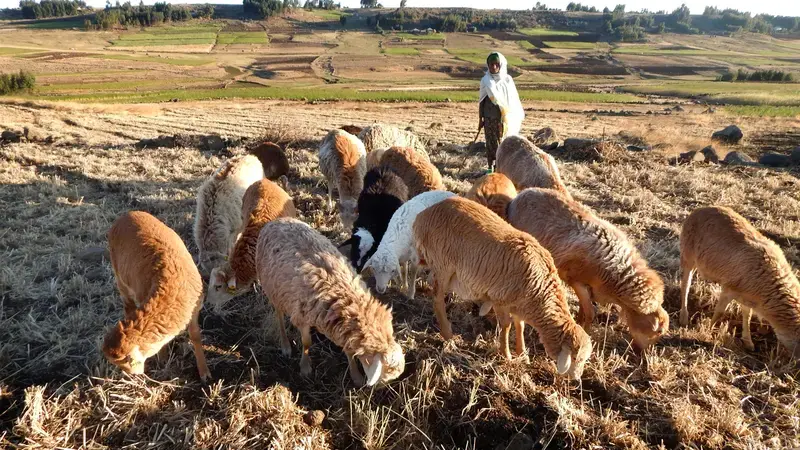Community-based breeding programs for sheep and goats

- Aynalem Haile - Principal Scientist - Small Ruminant Breeder
ICARDA’s community-based breeding program focuses on indigenous breeds and is suited to smallholder conditions, making it a sustainable alternative to conventional methods.
Modern livestock breeding methods are often unsuitable for poor households with small flocks of sheep and goats. ICARDA, CRP LIVESTOCK, and other partners have developed a more sustainable alternative: a community-based breeding program (CBBP) focused on indigenous breeds suited to smallholder conditions.
Community-based breeding increases the productivity and profitability of indigenous breeds without undermining their resilience and genetic integrity, and without expensive interventions.
The approach is participatory, relatively cheap, and implemented directly by farmers, unlike the often-unsuccessful conventional breeding programs involving nucleus schemes and/or importation of exotic breeds for crossbreeding.
KEY ELEMENTS OF THE APPROACH:
-
Farmers are trained to improve selection methods – i.e. retaining fast-growing ram/buck lambs/kids for breeding, rather than selling them.
-
Community flocks are pooled to enlarge the gene pool for breeding sire selection.
-
Interactions between farmers and scientists enable the evaluation of different breeding options and informed decisions on flock management.
-
A recording system monitors the performance of individual animals, leading to the estimation of breeding values for selection decisions and continuous genetic improvement.
-------------------------------------------------------------------------------------
IMPACT
-
In Ethiopia, where ICARDA has partnered with ILRI, the University of Natural Resources and Life Sciences (BOKU), and the Ethiopian National Agricultural Research System, more than 7000 households have benefited from CBBP. The program is generating a 20 percent average increase in farmer incomes.
-
Farmers have created more than 50 formal breeders’ cooperatives – which have been able to build capital from investments, including the buying of rams and bucks. One cooperative in southwest Ethiopia, for instance, has generated a capital of around US$ 96,000.
-
Successes of ICARDA’s approach to community-based breeding have now been integrated into the country’s national livestock plan. Through World Bank loans, the Ethiopian government and regional authorities are investing in the upscale of CBBP in the country.
-
The suitability of the program within different production systems and measurable genetic gains and socioeconomic impacts have drawn the interest of local and international investors and governments. CBBP is now being implemented in Sudan, Tanzania, Iran, Uganda, Malawi, Liberia, South Africa, and Burkina Faso.

Further Reading:
Haile, A., Getachew, T., Mirkena, T., Duguma, G., Gizaw, S., Wurzinger, M., Soelkner, J., Mwai, O., Dessie, T. , Abebe, A., Abate, Z., Jembere, T., Rekik, M., Lobo, R.N.B., Mwacharo, J.M., Terfa, Z.G., Kassie, G.T., Mueller, J.P. and Rischkowsky, B. 2020. Community-based sheep breeding programs generated substantial genetic gains and socioeconomic benefits. Animal https://hdl.handle.net/20.500.11766/9696
Aynalem Haile, Solomon Gizaw, Tesfaye Getachew, Joaquín Mueller, Peter Amer, Mourad Rekik, Barbara Rischkowsky. (30/9/2019). Community‐based breeding programs are a viable solution for Ethiopian small ruminant genetic improvement but require public and private investments. Journal of Animal Breeding and Genetics, 136 (5), pp. 319-328. https://hdl.handle.net/20.500.11766/10541
Joachim Muller, Aynalem Haile, Tesfaye Getachew, Mourad Rekik, Barbara Rischkowsky. (1/8/2019). Genetic progress and economic benefit of community-based breeding programs for sheep out- and upscaling options in Ethiopia. Small Ruminant Research, 177, pp. 124-132. https://hdl.handle.net/20.500.11766/10553
